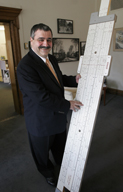New dean plans to engineer a bright future
New dean plans to engineer a bright future McGill University
User Tools (skip):
New dean plans to engineer a bright future

Christophe Pierre in his office-to-be with a very old piece of equipment. The working model slide rule was used for teaching and demonstration to Engineering undergraduates from the 1930s to the 1950s.
Christophe Pierre is enthusiastic about his new job. "I'm coming to a superb institution, with an international reputation." On July 1, Pierre becomes the new Dean of the Faculty of Engineering, taking the torch from John Gruzleski, who has served as Dean for the past five and a half years. "McGill's Faculty of Engineering has a great tradition of academic scholarship and research, as well as outstanding students," continues Pierre. "It's an honour to have been selected as the new dean."
Pierre joined the University of Michigan in 1985, one month after completing his doctorate at Duke University, and since 2002 has been the Stephen P. Timoshenko Collegiate Professor of Mechanical Engineering; he also serves as Associate Dean of Graduate Studies at the university's Horace H. Rackham Graduate School. In his tenure at Michigan, he has collected awards for outstanding teaching, excellence in research, and exceptional service to the Faculty. Clearly he is used to success as a teacher, researcher and administrator — skills that he will be bringing to his new job, where he will continue to build on the faculty's successes.
"The Faculty of Engineering's professors and its student body give it a tremendous foundation for securing and enhancing its position as a global leader in engineering research and education," he says. "McGill has an exciting group of people with great potential, and we can build on that through innovative programs." Innovation these days requires an ability to look beyond one's own field. "Research is becoming increasingly interdisciplinary; all the big problems in engineering cross traditional disciplinary boundaries. In addition, technological development is progressing at a rapid pace." These shifts in the professional landscape challenge traditional ways of working, and adapting to these changes will involve building partnerships across departments and with other faculties — such as medicine, science, and management — and institutions in Quebec, across Canada and internationally. "Many of these partnerships already exist at McGill," he notes. In recent years, the Faculty's strategic analyses have identified directions for growth, among them environmental design, bioengineering, and advanced materials and nanotechnology. "These fields are cross-disciplinary, including a number of engineering disciplines as well as expertise from outside the Faculty," he says. "The world of research has become global and interdisciplinary, and the universities that meet the challenges posed by these changes will become the leaders."
The shifting environment is not the only challenge. In education, a significant percentage of engineering graduates leave the field after a few years and migrate into management, medicine, law, and other areas. "Our job then becomes providing them with an education that builds a strong engineering core but also prepares them for diverse careers. This may require reforming the undergraduate curriculum," says Pierre. "And at the graduate level, we may want to explore degree programs with intense high-level courses tailored to the needs of people already working in industry.
These represent both challenges and opportunities."
Pierre is a global leader in research on vibrations and structural dynamics, a field with applications to the automotive and aerospace industries. "In aerospace, when something vibrates too much and for too long, it becomes fatigued, develops cracks, and may fail, which can be disastrous. In a jet engine, for instance, blades on the turbine and compressor stages can crack and undergo catastrophic failure — and you really don't want that to happen," he explains. He is concerned with modeling structures, then analyzing and predicting vibratory response, as well as altering their design to minimize vibrations. Industry has paid attention to his efforts, and has developed solid research relationships with companies such as Pratt and Whitney, General Electric, and Snecma. "I'll continue these collaborations at McGill," he said, noting that McGill's aerospace engineering program is an element in the faculty's strategic plan. "Naturally my first priority at McGill will be serving as the Dean, but I do plan to maintain some research activity. I believe it will be important to remain involved in research and also in teaching, to ensure I'm fully connected to the faculty and its students." Through his research community, Pierre has already come to know some McGill faculty members, either in person, such as Professor Emeritus Michael Paidoussis and Professor Martin Ostoja-Starzewski, or by reputation, such as Professor Stuart Price, all in the Department of Mechanical Engineering.
"McGill seems very collegial, which I like a great deal," Pierre says. "My family is also happy to move to Montreal, which we have visited many times. It is a vibrant multicultural city, and we look forward to living there. From both a personal and a professional point of view, coming to Montreal, and to McGill, is a great opportunity."
The fact that he inherits the Faculty of Engineering in such good form doesn't hurt, either. "John Gruzleski, the outgoing dean, has done a superb job here," says Pierre. "He leaves in my hands a faculty that is in excellent shape — which is a great starting point for a new dean."
